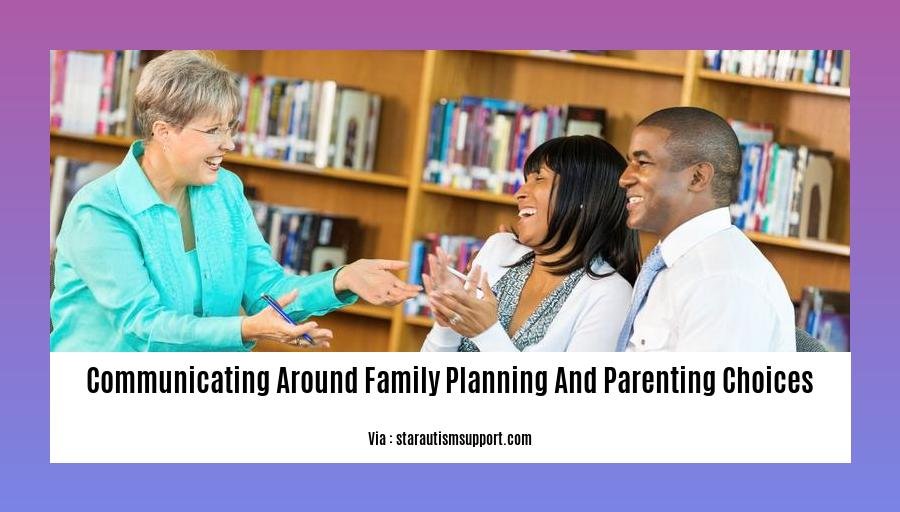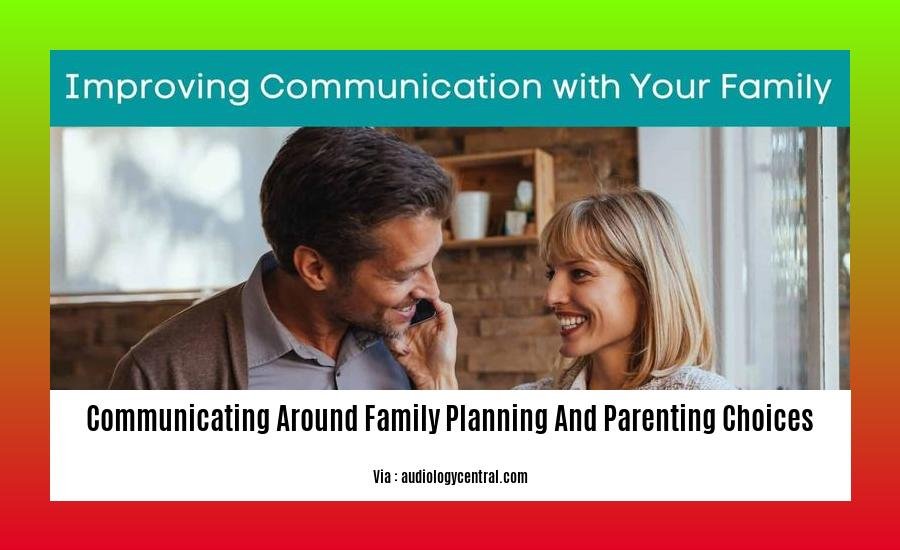In the realm of family planning and parenting, open and inclusive communication is paramount. Understanding the principles of family planning counseling, exploring diverse counseling types, and leveraging effective communication resources empower individuals and communities to make informed decisions about their reproductive health. Embark on this article to delve into Communicating Around Family Planning and Parenting Choices: Strategies for Inclusive and Equitable Dialogue, a guide to fostering supportive and equitable conversations around these crucial matters.

Key Takeaways:
- Communicate openly: Discuss family planning goals, values, and expectations.
- Establish a shared vision: Envision future parenting roles, responsibilities, and values.
- Prioritize your relationship: Schedule time for each other, maintain open communication, and support each other.
- Foster healthy communication styles: Engage in active listening, encourage open dialogue, and create a supportive environment.
- Promote parental unity: Discuss decisions together before involving children.
- Cultivate a positive communication culture: Model respectful communication, establish rules, and focus on improving parent-child relationships over time.
Communicating Around Family Planning and Parenting Choices: Building a Foundation for Success
Open and honest communication is the cornerstone of successful family planning and parenting. Communicating around family planning and parenting choices fosters understanding, builds trust, and ensures that all voices are heard and respected.
Essential Steps for Effective Communication
- Create a safe space: Establish an environment where individuals feel comfortable sharing their thoughts and feelings without judgment.
- Use active listening: Pay attention to what others are saying, both verbally and nonverbally. Reflect on their perspectives to demonstrate understanding.
- Emphasize empathy: Understand and acknowledge the emotions behind different viewpoints. This helps build bridges and reduce conflict.
- Be respectful: Treat others with dignity and consideration, even if you disagree with their opinions.
- Seek clarification: Ask questions to ensure that you fully comprehend what others are saying. This prevents misunderstandings and facilitates productive conversations.
Talking to Your Partner
Discussing family planning and parenting choices with your partner is crucial. Be open and honest about your desires, fears, and expectations. Communicating around family planning and parenting choices involves:
- Sharing your values and goals for the future
- Exploring different options and their potential implications
- Making joint decisions that align with both your needs
Engaging with Your Children
As your children grow, it’s essential to communicate around family planning and parenting choices in an age-appropriate manner. Start by:
- Answering their questions honestly and respectfully
- Providing information about reproductive health and family planning
- Discussing values and ethics related to family planning
- Supporting their decision-making process
Embracing Inclusivity and Equity
Communicating around family planning and parenting choices should be inclusive of diverse perspectives and experiences. This includes:
- Respecting different cultural norms and beliefs
- Addressing intersectionality and the unique challenges faced by marginalized communities
- Providing accessible information and resources to all
- Empowering individuals to make choices that are right for them
By embracing these principles, we can foster open and equitable dialogue around family planning and parenting choices, empowering individuals and families to make informed decisions that align with their values and aspirations.
Learn how to discuss fertility and family desires in a relationship effectively, and find tips for communicative decision-making around having kids. Additionally, discover ways to get on the same page about parenting for a harmonious family life.
Types Of Counselling In Family Planning
Family planning counseling is crucial in guiding individuals and families in making informed decisions about their reproductive health. Various types of counseling are available, each tailored to specific needs and circumstances:
-
Preconception Counseling: Provides guidance and support to couples before they conceive, addressing factors like health status, genetic risks, and family planning goals.
-
Prenatal Counseling: Offers support and education during pregnancy, covering prenatal care, birth options, and potential health risks.
-
Postpartum Counseling: Assists new parents with challenges and adjustments in the postpartum period, including breastfeeding, infant care, and emotional well-being.
-
Counseling for Unplanned Pregnancy: Provides support and options counseling for individuals or couples who face an unplanned pregnancy, empowering them to make informed decisions.
-
Counseling for Infertility: Offers support and guidance to couples experiencing infertility, exploring possible causes, treatment options, and emotional coping mechanisms.
-
Counseling for Sexual Health: Addresses sexual concerns and provides information on sexually transmitted infections (STIs), contraception, and sexual practices.
-
Counseling for Family Planning Methods: Informs individuals and couples about various family planning methods, their effectiveness, potential side effects, and suitability for different lifestyles.
-
Counseling for Reproductive Loss: Offers support and guidance to individuals or couples who have experienced miscarriage, stillbirth, or infant loss.
Key Takeaways:
- Family planning counseling provides a safe and supportive environment for individuals and families to explore reproductive choices.
- Different types of counseling cater to specific needs and circumstances, ensuring comprehensive support and guidance.
- Counseling empowers individuals to make informed decisions and navigate reproductive health challenges.
Relevant URL Source:
Family Planning Counseling | USAID
Effective Communication Resources
When discussing family planning and parenting choices, open and inclusive communication is key to fostering understanding and making informed decisions. Leveraging effective communication resources can greatly enhance these conversations.
Key Takeaways:
- Name the problem without blaming: Avoid accusations or fault-finding.
- Focus on understanding: Seek to comprehend the perspectives of others.
- Use active listening: Pay attention and respond empathetically.
- Choose the right time and place: Select a relaxed and private setting for discussions.
- Be respectful and empathetic: Validate emotions even if you disagree.
- Use “I” statements: Express your own views without blaming others.
- Avoid interruptions: Allow others to finish speaking before responding.
Effective Communication Resources
Utilizing effective communication resources can significantly improve family planning discussions. These might include:
- Books and Articles: Insightful literature on family planning, parenting, and communication strategies.
- Online Forums and Support Groups: Connect with others facing similar challenges and share experiences.
- Counselors and Therapists: Seek professional guidance from trained experts specializing in family planning and communication.
- Workshops and Trainings: Participate in organized sessions designed to enhance communication skills and knowledge.
By incorporating effective communication resources into discussions, families can foster inclusive dialogue, build mutual understanding, and make informed choices about their reproductive health and family planning goals.
Citation:
- Building Effective Family Communication

FAQ
Q1: What are the three main areas of focus during family planning counseling?
A1: Family planning counseling focuses on establishing the client’s goals, exploring their current knowledge and beliefs about family planning, and providing accurate information on available methods.
Q2: Describe the GATHER approach used in family planning counseling.
A2: GATHER stands for Goals, Ascertain, Talk, Help, Evaluation, and Referral. It is a framework used to guide clients through a dialogue to explore their reproductive intentions and provide them with the necessary information and support.
Q3: How can effective communication improve family planning decisions?
A3: Open and inclusive communication between partners and family members allows for a shared vision of the future, discussion of parenting roles and values, and prioritization of the couple’s relationship amidst the changes that come with having children.
Q4: What are some tips for building effective family communication around family planning?
A4: Focus on understanding the other person’s perspective, use active listening, choose the right time and place for conversations, be respectful and empathetic, use “I” statements, avoid interruptions, and consider professional help if needed.
Q5: What resources are available to support effective family planning communication?
A5: Family planning counseling services, healthcare providers, family counseling or therapy, and online resources such as Healthline and Psychology Today can provide information, support, and guidance on family planning communication.










